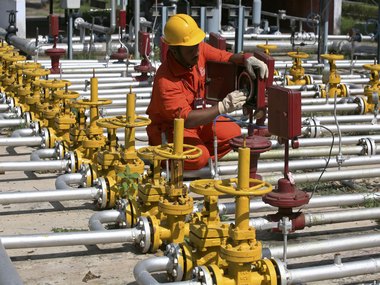Shares of oil and gas companies rallied on Friday after the government approved a doubling in domestic gas prices from next April, signalling its intent to make the country’s troubled energy sector more attractive for investment.
Shares in the largest state producer, ONGC jumped 5.4 percent in early trade, while Reliance Industries, which operates the country’s biggest gas block off the east coast along with BP, rose 3.4 percent in a strong market.
State energy companies said the government’s decision late on Thursday to approve a gas price hike for the first time in three years would boost their profits. Indicative pricing suggests domestic gas could double to around $8.4 per mmBtu from April 1, 2014.
According to Ambit, the gas price hike will boost domestic gas production over 3-5 years by incentivising gas producers to invest in gas exploration and production in India and improving viability of many gas fields which were otherwise not viable at current low gas prices.
[caption id=“attachment_913387” align=“alignleft” width=“380”] Reuters[/caption]
For ICICI Direct, ONGC and Oil India are the clear winners.
“ONGC and Oil India would be the major beneficiaries of this price hike as they are the largest producers of Administered Price Mechanism (APM) gas. The benefits for these two companies include their investments in deepwater gas discoveries turning viable, thus leading to higher investments in offshore gas discoveries and higher gas production in future,” said ICICI Direct in a research note.
Impact Shorts
More ShortsBut CLSA believes that ONGC and Oil India may not gain as much as RIL as the government may choose to take back part of this benefit by increasing subsidy burden of these companies.
According to Motilal Oswal, the gas price hike will give the necessary impetus for investment in the domestic oil and gas sector and will alsoimprove the viability of new fields of RIL, ONGC and Oil India. “This would result in fast tracking of the capex by RIL in its satellite fields in KG-D6 and also development on NEC-25,” it said in a note. This is becausecommercial viability of some of RIL’s discoveries in KG basin was earlier rejected by DGH due to unviability at USD4.2/mmbtu.
However, the impact is negative for GAIL, IGL and Guajrat Gas.
According to Ambit, a higher gas price could hit GAIL’s petrochemical ad LPG margins because it uses domestic gas for both these businesses. “A 10% increase in gas price would result in a 3.5% decline in our FY15-16 earnings estimates assuming subsidy sharing mechanism remains unchanged.For IGL and Guajrat Gas, the brokerage said since domestic gas constitutes a bulk of theor total mix, an increase in dometic gas price would require them to increase their end price significantly.
The revised prices would put India roughly in line with Indonesia’s $6-$9 per mmBtu, but were still short of typical LNG import costs.
Demand for gas in India’s economy far outstrips production, as India’s desire to keep prices cheap for the power and fertiliser industries deters investment in costly producing areas and in pipelines and terminals for more expensive LNG.
India, the world’s fourth-largest energy consumer, uses coal for nearly 56 percent of its energy needs, while oil accounts for another 26 percent. It aims to double the proportion of gas in its energy mix to 20 percent by 2020.
ONGC expects to add about Rs 8000 crore in profits annually thanks to the increase in gas prices, its finance head said.
Oil India is likely to add about Rs 1000 crore in profits annually, Kumar said.
Billionaire Mukesh Ambani’s Reliance, which has seen a slump in gas output from its KG D6 gas fields, has said gas prices need to be increased in order to encourage further investment.
“We project upside of 39 percent for ONGC and 20 percent for Reliance for our FY 2015 earnings estimates. At constant currency, we estimate the earnings upside at 26 percent for ONGC and 4 percent for Reliance,” Morgan Stanley analysts said in a note on Friday.
The price increase is expected to be unpopular with voters ahead of local and national elections in the next 12 months, but is key to easing acute power shortages in the country, where cheap gas deters investment and keeps demand far above actual use.
With inputs from Reuters


)

)
)
)
)
)
)
)
)



